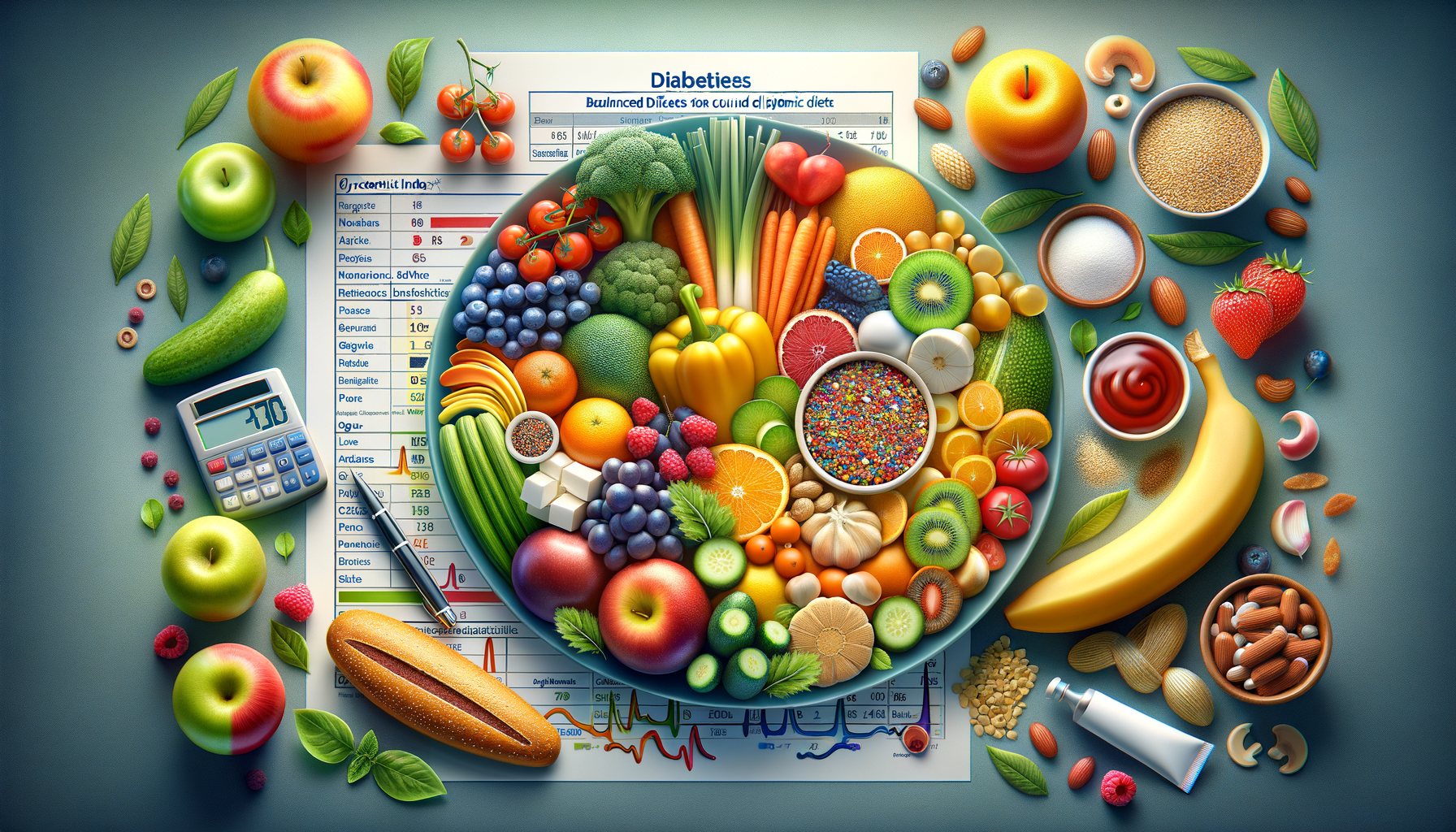Understanding Diabetes and the Role of Diet
Diabetes is a chronic condition characterized by elevated blood sugar levels, which can lead to a variety of health complications if not managed properly. Central to the management of diabetes is the role of diet. A balanced diet in diabetes management focuses on controlling blood glucose levels, maintaining a healthy weight, and preventing complications. The importance of diet cannot be overstated, as it directly impacts the body’s insulin sensitivity and overall metabolic health.
It’s essential to understand the types of diabetes: Type 1, Type 2, and gestational diabetes. Each type requires a specific approach to diet and lifestyle. However, the common thread is the need for a balanced diet rich in nutrients and low in simple sugars. For instance, individuals with Type 2 diabetes often benefit from diets that emphasize whole grains, lean proteins, and plenty of fruits and vegetables.
Incorporating a balanced diet helps in regulating blood sugar levels and reducing the risk of cardiovascular diseases, which are prevalent among diabetic patients. Key components of a diabetic diet include:
- High fiber content to slow down glucose absorption.
- Low glycemic index foods to prevent spikes in blood sugar levels.
- Healthy fats to support heart health.
- Controlled portion sizes to aid in weight management.
By understanding the role of diet, individuals with diabetes can make informed choices that support their health and well-being.
Components of a Balanced Diabetic Diet
A balanced diabetic diet is composed of various food groups that provide essential nutrients while maintaining blood glucose levels. The key is to focus on nutrient-dense foods that offer maximum nutrition without contributing to glucose spikes. Here are some critical components:
Carbohydrates: Carbohydrates have the most significant impact on blood sugar levels. Choosing complex carbohydrates like whole grains, legumes, and vegetables can provide energy while keeping blood sugar stable. It’s important to monitor carbohydrate intake and distribute it evenly throughout the day.
Proteins: Protein is essential for building and repairing tissues and can also help in controlling hunger. Lean sources such as poultry, fish, tofu, and legumes are excellent choices. Protein should be included in every meal to help with satiety and blood sugar control.
Fats: Not all fats are created equal. Healthy fats, such as those found in avocados, nuts, seeds, and olive oil, can support heart health and provide essential fatty acids. It’s crucial to limit saturated and trans fats, which can increase the risk of cardiovascular disease.
Fiber: Fiber is a vital component of a diabetic diet as it helps slow down the absorption of sugar, thus preventing spikes in blood glucose levels. Foods rich in fiber include whole grains, fruits, vegetables, and legumes.
By incorporating these components into their diet, individuals with diabetes can enjoy a variety of foods while effectively managing their condition.
Meal Planning and Portion Control
Effective diabetes management involves careful meal planning and portion control. This ensures that individuals consume balanced meals that meet their nutritional needs without causing blood sugar spikes. Meal planning can be simplified by following a few guidelines:
Plate Method: A practical approach is using the plate method, where half the plate is filled with non-starchy vegetables, a quarter with lean protein, and the remaining quarter with whole grains or starchy vegetables. This method helps in visualizing portion sizes and ensuring a balanced intake of nutrients.
Regular Meal Timing: Eating at consistent times each day can help regulate blood sugar levels. Skipping meals or having irregular meal times can lead to fluctuations in blood glucose levels and increase the risk of hypoglycemia or hyperglycemia.
Snacking Wisely: Healthy snacks can prevent overeating during meals and help maintain energy levels. Opt for snacks that combine fiber and protein, such as a small apple with peanut butter or a handful of almonds.
Portion control is crucial in preventing excessive calorie intake, which can lead to weight gain and insulin resistance. Using smaller plates, measuring food portions, and being mindful of serving sizes can aid in maintaining a healthy weight and improving diabetes management.
Incorporating Physical Activity
While diet plays a pivotal role in diabetes management, physical activity is equally important. Regular exercise can enhance insulin sensitivity, help with weight management, and improve cardiovascular health.
Individuals with diabetes should aim for at least 150 minutes of moderate-intensity aerobic activity per week, such as walking, cycling, or swimming. Strength training exercises, performed two to three times a week, can also be beneficial in building muscle mass and improving metabolic rate.
Exercise can also have immediate effects on blood sugar levels. It’s advisable to monitor blood glucose before and after physical activity to understand how different exercises impact individual blood sugar responses. This information can be used to tailor exercise routines and ensure they complement dietary efforts.
Incorporating physical activity into daily routines, such as taking the stairs instead of the elevator or walking during lunch breaks, can make a significant difference in managing diabetes effectively.
Monitoring and Adjusting the Diet
Monitoring blood sugar levels regularly is essential for individuals with diabetes. This helps in understanding how different foods affect blood glucose levels and allows for necessary adjustments in the diet. Keeping a food diary can be beneficial in tracking meals, snacks, and blood sugar readings.
Based on these observations, individuals can make informed decisions about their diet. For instance, if a particular food consistently causes blood sugar spikes, it may need to be reduced or replaced with a healthier alternative. Consulting with a registered dietitian or a certified diabetes educator can provide personalized guidance and support in making dietary adjustments.
It’s also important to stay informed about new research and dietary guidelines related to diabetes management. As our understanding of nutrition evolves, so too should our approach to managing diabetes through diet.
By actively monitoring and adjusting their diet, individuals with diabetes can maintain better control over their condition and improve their overall quality of life.




Leave a Reply